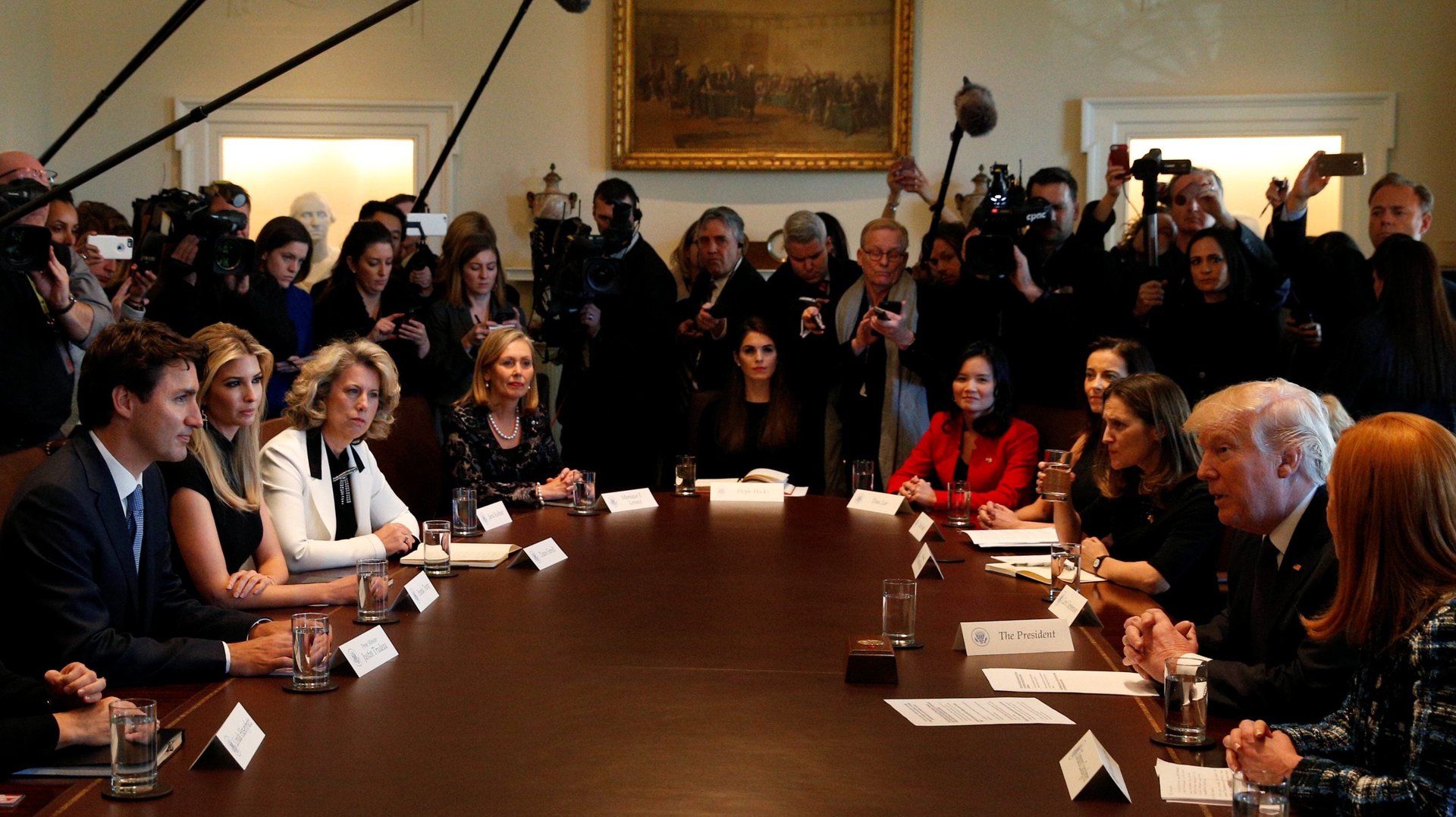The Canada-US task force of women CEOs in a photo opp with Trump and Trudeau seems to have “vaporized”
Remember that time when US president Donald Trump made a big deal out of the role women should play as business leaders?


Remember that time when US president Donald Trump made a big deal out of the role women should play as business leaders?
It happened Feb. 13, when Trump hosted Canadian prime minister Justin Trudeau for their first White House meeting. On the agenda was a 35-minute meeting in which the two leaders and Ivanka Trump, the president’s daughter, announced a new Canada-US task force dedicated to women in business and female entrepreneurs. Surrounded by a thicket of cameras, the three sat around a White House table crowded with female business executives from both nations and talked about breaking down barriers for women in senior leadership positions, among other topics.
The initiative by Trudeau, a self-proclaimed feminist, and Trump, a man who has been repeatedly accused of chauvinism and sexual harassment, seemed to hold promise, even if it offered few specifics.
“In order to create economic growth and lots of very good, well-paying jobs, we must ensure that our economy is a place where women can work and thrive,” Trump said. In a press release, the White House added: “President Trump wants to pave the way for women to bring their unique perspectives and strengths to the business world, and to harness the full potential of female entrepreneurs in our economy to make America great again.”
The board of the new organization (burdened with a rather cumbersome name, the Canada-United States Council for Advancement of Women Entrepreneurs and Business Leaders) was to include 10 female CEOs from both countries. The US contingent included Mary Barra, CEO of GM, and Julie Sweet, Accenture’s CEO of North America; and the Canadian group included Tina Lee, CEO of T&T Supermarket, and Linda Hasenfratz, CEO of Linamar, an automobile parts maker. The idea originated with a woman, Katie Telford, chief of staff in the prime minister’s office in Canada, according to government officials quoted in news reports.
But from the beginning, the photo opp seemed a bit fishy. It was never made clear to the media what exactly was the expectation for the new group. How would it operate? Exactly which issues would it tackle? And what did Ivanka Trump have to do with real working women? The media was skeptical.
Two months later, the group’s mission is no clearer, as Anne Kingston, a journalist with the Canadian newsmagazine Maclean’s, discovered. What’s more, the group, whose name Kingston hilariously shortens to CUSCFAOWEABL, “appears to have vaporized”:
CUSCFAOWEABL is either AWOL, MIA, or DOA. Which one isn’t clear. In late March, Maclean’s asked the government when the council would next meet. The request was forward [sic] to Global Affairs Canada, where a spokesman said “nothing is scheduled at the moment.” When asked again this week, a PMO [prime minister’s office] spokesman responded: “I couldn’t give you a specific timing, but it is in the works.” There is no apparent infrastructure, or so much as a dedicated executive assistant, supporting the group. When asked for the name of the coordinator on the U.S. side, the PMO told Maclean’s via email they did not have that information and that it would be best “to try via the [White House]. Maclean’s inquiries to the White House went unanswered.
Quartz has also contacted the White House and the prime minister’s office in Ottawa, asking for an update on the task force. We will update this post with any response.
There are a couple of hopeful signs that the group is still extant: In an email leaked to the media yesterday, the White House lists the creation of the council among President Trump’s “100 Days of Accomplishments,” without further elaboration.
And the Canadian government’s 2017 budget, released last month, mentions the working group, saying Ottawa has asked it for advice on “swift actions to address barriers that affect women serving in senior leadership positions and increase competitiveness for women entrepreneurs.” It does not, however, earmark any funds for the initiative.
So maybe the council isn’t totally off the radar, but it’s not exactly in formation either.
Quartz contacted the 10 companies whose CEOs were listed as members of the CUSCFAOWEABL to ask about the group’s operations. Many offices wrote back to suggest we try the prime minister’s office in Canada or the White House.
An assistant to Deborah Gillis, CEO of Catalyst, a New York-based research firm dedicated to women in the workplace, told us, “We have received no updates about future meetings.” She also said that to her CEO’s knowledge, “no future meetings had been scheduled.”
When Kingston called the companies, she heard back from Annette Verschuven, CEO of Toronto-based NRStor, an energy storage company. Verschuven seemed to ask for patience, telling the journalist: “Why don’t you check with me in a few months?”